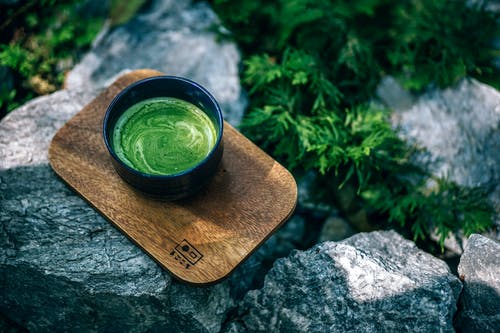Matcha is a popular tea among supporters of a healthy lifestyle. The number of lovers of this drink is growing every day in the world. This is not a new tea. It was used in the distant past in Japan. The matcha has been used in a tea ceremony in Japan for many years. But only recently people started talking about its usefulness.

This unusual tea has a deep dark green color. The harvesting process takes place once a year and two weeks before the harvest; the leaves are covered to protect them from sunlight.
After the entire crop is harvested, the leaves are processed in one of two ways. One of them is the drying of twisted leaves, and the second is drying with straight leaves which are then ground.
Regardless of how the leaves are processed, they contain a large number of amino acids that give the tea a sweet taste.
Matcha is a special form of green tea in powder form.
The way to prepare matcha is quite simple. You should take a teaspoon of powder and pour a cup of hot water. Then whip the mixture into the foam with a bamboo stick.
Advantages of Matcha:
It contains a large number of antioxidants and vitamins. No tea can boast of so many nutrients. It contains 127 times more epigallocatechin gallate than a cup of regular green and 100 times more antioxidants.
A positive effect on the nervous system makes matcha a popular drink among people who meditate. After a cup of this tea, your body relaxes, and your concentration increases.
Matcha contains caffeine, the amount of which is equal to the amount of caffeine in the coffee. But, in addition to match caffeine, it contains L ‑ Theanine. This substance, along with caffeine, acts gently on the nervous system. After coffee, you get a feeling of nervousness, and after matcha, you feel a surge of strength without side effects.
L ‑ Theanine in matcha takes part in the development of dopamine and serotonin. Therefore, after a cup of matcha, you feel joy and your mood improves significantly. Therefore, often people drink matcha for relaxation after stress.
Matcha helps the gastrointestinal tract work properly. Matcha is an alkaline agent and helps to cope with an acidic environment.
Matcha green tea speeds up metabolism and helps the body burn fat about four times faster than usual. At the same time, matcha does not cause any side effects (increase in heart rate, high blood pressure);
Matcha helps the skin cope with environmental influences. Sometimes matcha is used in cosmetology. It helps restore skin after exposure to ultraviolet rays.
It prolongs youth. Antioxidants help your body be young and healthy at the cellular level. Matcha is a source of antioxidants. Therefore, its daily intake rejuvenates your body.
Comments are closed, but trackbacks and pingbacks are open.